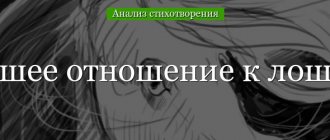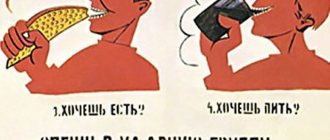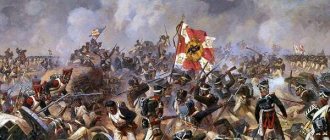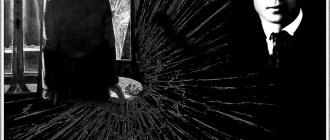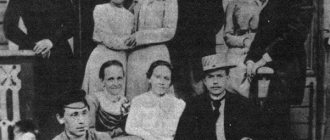The history of the creation of the poem
“On Rubbish” was written during the Civil War, at the beginning of the New Economic Policy in 1920-1921. This begs the question: who is this poem dedicated to? The poet begins his work with lines about the heroes of the war, and literally immediately proceeds to describe the life of civilians, in addition, he touches on the so-called “philistines,” immediately noting that he does not at all object to their “philistine class.” It is worth noting that the author does not call philistines a social group of people, as is customary that philistines are the population of the city, but those who have been stuck in a routine. It is very striking how prematurely the author was able to predict upcoming phenomena and name the enemy of the revolution to his face. He accurately captured the flow of affairs in society, which many years later led to the collapse of the Soviet Union.
Subject
The main theme of the work is the denunciation of the philistinism, which managed to perfectly adapt to the renewed country. However, the poet immediately warns that he has nothing against philistinism as a class. First of all, he ridicules those people whose essence is a mixture of rudeness, vulgarity and duplicity.
This attitude of the poet towards philistinism is easy to understand. During the hard times of the Civil War, many worthy people died who selflessly sacrificed their own lives for the sake of high ideals. While all sorts of “rubbish” hid in warm corners, waiting out hard times. The victory of the Bolsheviks and the restoration of peaceful life became the reason that the “murlo of the tradesman” felt safe and was even able to adapt to new conditions.
Being a desperate idealist, Mayakovsky with all his being longed for the complete and unconditional victory of the new system over the remnants of bourgeois society. However, this did not happen, which the poet bitterly regrets in his work.
In the poem “On Rubbish,” he draws typical images of modern philistines: a nameless employee who set up a “cozy office” in one of the government agencies, and his wife, “Comrade Nadya.” All communication between the married couple comes down to conversations about improving their own little world. However, at the same time, they are making every effort to create the appearance of people of a new formation, and they are doing it well.
The poem pays a lot of attention to the theme of bourgeois life, which absorbs all the thoughts and actions of ordinary people. The poet draws the obligatory attributes of a well-fed and comfortable life for the bourgeoisie: a samovar, a piano, a cat, a cage with a canary. But at the same time, in their house there will certainly be a recent issue of Izvestia, and a portrait of the ideological leader on the wall.
The poet’s strong rejection of philistinism is due to the fact that he is well aware of how dangerous it is for society. There are many such people among officials and in the ranks of the government apparatus, and this poses a huge threat to the entire idea of communism.
Directions and elements of verse
One of the key elements of the poem “On Rubbish” is the “canary” that appears at the end of the work. Here it is obvious that the poet is referring to an ancient clock that chimed at an even time, and at that moment a bird jumped out of it with a specific sound. It is unlikely that this could be a real canary, because then the character would come out of the ordinary, and if this bird is from a watch, then the weight is normal, because at that time every second person in the house had such mechanisms. In addition, the “canary” in the work is a certain symbol of philistinism, and all the “rubbish” that subjugated the revolution. Moreover, the poet’s mentioned phrase “this or that scum” is a collective image of a “bird”. It becomes clear that in his work the poet embodies the image of Karl Marx and the ideals of the revolution, since the portrait of the philosopher is also of utmost importance; accordingly, he is the opposite of the “bird”. Many ordinary people agree with the image of the “bird,” just like the author of the work himself; it becomes clear that Vladimir Mayakovsky definitely gravitates towards the standards of the revolution, as well as towards the very philosophy of the great thinker. I wonder where the lyrical hero is? Oddly enough, here he is absolutely precisely connected with the image of Vladimir Mayakovsky himself. This is exactly the moment when the image of the poet and the portrait of the lyrical hero of the poem coincide completely. Vladimir Vladimirovich Mayakovsky wrote this verse on his own behalf.
Summary
The lyrical hero glorifies famous people who have proven their importance with valor and courage. But I don’t want to talk about them. The hero emphasizes that it’s time to talk about rubbish . The revolution passed, everything seemed to calm down and the RSFSR appeared. But at the same time the townspeople appeared. The hero makes a reservation that he has nothing against such a class; he is rather worried about something else.
During the Civil War, many people sacrificed their lives to defend their ideals. But there were also those who preferred to sit out in warm corners. It is against them that the hero stands. As soon as everything calmed down, these people quickly changed their clothes and began to confess their love for the new government.
Five years have passed, they are also firmly seated in various institutions and look good . Such individuals are only concerned with the structure of their own world.
In the evening, such an employee will come home to his wife, Comrade Nadya. Together they discuss a salary increase. The husband dreams of buying breeches, and the wife dreams of a dress with the hammer and sickle emblem.
The apartment of such philistines is quite ordinary. A portrait of Marx hangs on the wall, a kitten sleeps, and a canary sings in a cage. But this picture is interrupted by a revived economist. He screams and demands to stop the philistine way of life. Marx orders the canary's neck to be wringed.
Problems and mood of the work
If we analyze this poem in more detail, we can determine that it is based on the problems of the internal enemy of communism. In this case, the enemy is meant not as a class or ideological image, but as the inner qualities of a person. For example, pettiness, cowardice and lack of real deeds, but only imitation, here the poet makes many unflattering comparisons. Most of Vladimir Mayakovsky's works are subject to an emotional-revolutionary, propaganda, and rather figurative mood. If we talk about the problems inherent in this work, we can highlight the threat to the activity of the entire revolution in the form of a lack of quality personnel in the state government system, in other words, the power of the bureaucracy and its immorality.
Composition
The poem “On Rubbish” is characterized by a very unique compositional structure: it consists of 8 stanzas of different lengths - from one-line (1st stanza) to multi-line (28 lines - 7th stanza). The work begins with the poet’s exclamation of praise, which the next moment gives way to bitter satire. This is a kind of beginning of the poem.
In the next 6 stanzas, Mayakovsky shares his thoughts on the reasons for the “survivability” of the philistinism in the country of the Soviets. He vividly and colorfully describes the image of a typical middle-class married couple.
The last stanza contains the culmination of the work, the angry speech of Karl Marx depicted in the picture, who could not stand the terry philistinism.
The poem is written, like many of Mayakovsky's works, in accented verse (the size of tonic versification, in which the number of unstressed syllables between stressed syllables can exceed 4 syllables).
The main idea of the work
Vladimir Vladimirovich, like most different authors of that era, accepted the revolution with inspiration, and even to some extent idealized it. However, as we know, any idealization is not characterized by human mediocrity and facelessness. Mayakovsky does not perceive, and even despises, human weakness, conveying this in his poem through the seemingly revived image of Karl Marx. Through this, it is obvious that the poet is trying to make a call to save the revolution from the so-called “philistinism”. The main idea of the work is definitely that for ordinary people the ideals of the revolution do not fully mean anything, and they can betray at any moment, just as they left their old regime. The author notes that they will do this as soon as “the wind changes,” which indeed happened at the end of the twentieth century with the Soviet Union. It is extremely surprising that Vladimir Mayakovsky was able, even at the very beginning of the emergence of the Soviet Union, to discern one of the main reasons for its future collapse. In addition, the essence of the work “On Rubbish” can be read in the last six lines of the verse. The author's exclamatory warning is clearly expressed there. And indeed, his concerns were confirmed decades later, as we now know, from the course of modern history.
Satirical motives
In the post-revolutionary years, Mayakovsky's satire intensified, becoming sharper and more topical. At the early stage of his work, the poet opposed himself to the insensitive crowd, which did not understand the lofty ideals of the writer. After the revolution, all of Mayakovsky’s sarcasm fell on the enemies of communism. The poet especially ridiculed philistinism in all its manifestations. The burghers, who were well settled and prosperous in the new Soviet life, were seen by Mayakovsky as a defeat for the supporters of the revolution. But in order to better understand and penetrate these ideas, a creative analysis of Mayakovsky is necessary. “About Rubbish” is a poem that best suits this purpose.
The work begins with a sharp contrast. The first lines, which sound like: “Glory, Glory, Glory to the heroes!” continue in absolutely contrast: “Now let's talk about rubbish.” But who is this “rubbish”? She turns out to be the “philistine class”, which not only survived during the revolution, but also perfectly adapted to the new life, acquiring “cozy offices and bedrooms.” Any analysis of Mayakovsky is distinguished by expression and notes of indignation. “About Rubbish” was no exception and absorbed all the indignation and protest of the poet.
The bourgeoisie, in Mayakovsky’s understanding, are not just disgusting and disgusting because of their way of life, from which one can only callus “from sitting for five years their butts, as strong as washbasins.” No, they are also dangerous opportunists and bureaucrats. Mayakovsky's satire in this poem is merciless and inexorable.
Metaphors of the work
Of course, Mayakovsky’s poem is in all respects filled with his unique literary techniques and various epithets.
The work is fully filled with metaphors; it is worth noting some of its tropes. For example, one of the most powerful lines of the verse “the storms of the revolutionary bosoms have calmed down,” it is clear that this is a metaphor, and the storm means revolution. Also, maybe oh, here the author means by the word “hodgepodge” the activities that actually occur within the nascent Soviet state. In this line the metaphor is used several times, “covered with mud” - likening a swamp. However, the author structures many of his works in such a way that up to three different metaphors can be used in one line. It is worth noting that the poet quite often uses colloquial phrases in his poem, for example, “getting tired of the samovar.” In addition, in the work you can find the complex epithet “rabid”, in which the image of a screaming bird appears in your head. And I would like to note the neologism “canary”, which is based on the principle of the original ending. This gives specificity, and even strangeness to the overall image, in contrast to just a “canary”. Another impressive line from the poem “The philistine life is more terrible than Wrangel. Quickly turn the heads of the canaries so that communism is not beaten by the canaries!” here two phrases “canaries” and “philistine life” intersect, they seem to become spiritualized, and pose a real danger to communism. With such unprecedented literary techniques, the author adds a unique stylistic coloring to his works. Vladimir Mayakovsky’s poem “On Rubbish” is completely imbued with means of expression, and it has incredible poetic power. Interesting? Save it on your wall!
Analysis of the work according to plan
Analysis of the poem “On Rubbish” by Mayakovsky according to plan may include the following points:
- Title of the work.
- When was the poem written, what prompted its writing. In this case, the poet’s dissatisfaction with the bourgeoisie.
- Artistic means used by the poet (neologisms, contrast, diminutive suffixes).
- The image of a hero. In this case, it is a tradesman with his low interests.
- A student's opinion about the work.
Means of expression
This poem is replete with the signature poetics of Vladimir Vladimirovich. There are also epithets and metaphors. There are a fairly large number of different tropes throughout the entire work.
But most of all, the text contains metaphors, with the help of which the author best paints the surrounding picture.
There is also colloquial vocabulary.
Thanks to succinct epithets, the author adds color to the text, making it “alive.”
We can conclude that Vladimir Mayakovsky did not skimp on the means of artistic expression, using them to the fullest.
Topics, problems
The main theme of the work is the appearance of the philistinism, which managed to adapt and adapt to all the innovations in the state. Mayakovsky treats with irony those people who personify rudeness, vulgarity and duplicity.
The author's attitude is quite understandable. After all, great people gave their lives during the Civil War. They did not spare their lives, giving them for a great goal. At this time, “all sorts of rubbish” sat in a warm place, waiting for others to give their lives. Thanks to the fact that the Bolsheviks won, peaceful life returned to the streets of the state. That’s when the “rubbish” felt completely safe, and later even adapted and lived happily ever after.
The author criticizes pettiness, love of comfort, as well as the ability to adapt to any conditions.
At the same time, the entire mood of the poem is of an emotional and revolutionary nature. You can hear the motives of agitation and expressiveness in it.

